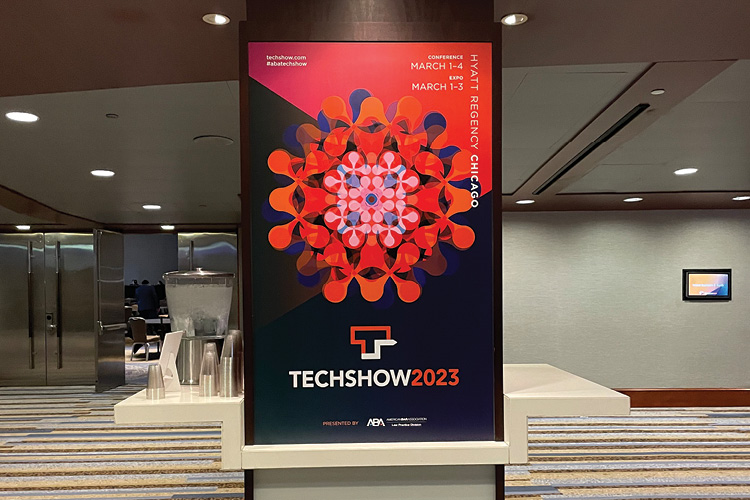ChatGPT and other AI chatbots dominated the first fully in-person ABA Techshow in 3 years

Photo of Techshow by Elmarie Jara
ChatGPT was on the minds of vendors and attendees at the ABA Techshow 2023 in early March, when more than 1,700 people gathered for the ABA’s first fully in-person legal technology event in three years.
After the all-virtual offering of 2021 and a subdued 2022 hybrid event for which attendance was hampered by a wave of COVID-19 cases, there was a sense of business as usual at this year’s Techshow Expo Hall.
Vendors and attendees were eager to talk about ChatGPT, a chatbot created by OpenAI. The chatbot, which provides humanlike responses to user prompts, has taken the world by storm, with 100 million active users by January. And generative artificial intelligence is expected to transform the practice of law. (See “Words With Bots,” page 34.)
“It doesn’t actually change anything about the lawyer’s ultimate responsibility or the work that they do for a client,” said Casetext co-founder and chief innovation officer Pablo Arredondo during a panel discussion at Techshow. “This is a tool to help lawyers do what they do every day.”
Several other legal tech companies on the floor already have integrated ChatGPT-based tech into their products, including Spellbook by Rally, an AI legal assistant, and Jurisage, a legal research platform.
Colin Lachance, co-founder and CEO at Jurisage and a 2014 Legal Rebel, said attendees who come to the conference are people who think they have to innovate to thrive.
“I’d say that’s the other common thread. It’s less about specific technologies and more about attorneys forecasting the difference between those who will survive in a tech-powered world and those who are missing the boat because they’re not here,” Lachance said.
Techshow touched on other things besides ChatGPT. Universal Migrator, an application that claims to simplify and automate data transfer and file backups, won first place in the annual Startup Alley pitch competition that has served as the opening session at Techshow since its inception in 2017. Additionally, the second of two keynote sessions took the form of a mock hearing to debate the always-controversial issues of amending ethics regulations to allow for nonlawyer ownership of law firms and relaxing unauthorized practice of law rules as a means of bridging the access-to-justice gap in this country.
Meanwhile, there were several panel discussions and educational sessions that covered a wide range of issues relating to legal technology and workplace productivity.
At a panel titled “Web3 and Law Firm Financials,” Jamie Szal, a Maine tax attorney and partner at Brann & Isaacson, and Jessica Neer McDonald, a Florida sole practitioner at the firm Neer McD, pointed out that although it’s hard to know where a client paying through blockchain technology is based, lawyers have to find out for tax purposes.
“In the blockchain world, anonymity is part of the appeal for a lot of people,” Szal said. “That makes important tax rules especially challenging.”
States require that virtual currency be converted to U.S. dollars, and many jurisdictions, including Michigan and Wisconsin, have guidance on treating cryptocurrency as a cash equivalent, according to speakers. Federal rules figure in too.
“The IRS is far out ahead of most states regarding how you record and report taxable income as it relates to digital assets,” Szal said.
Another session dealt with best practices for using Zoom and other telecommunication tools to conduct remote courtroom proceedings. To avoid virtual disasters such as using a cat filter during a court proceeding or the Skype bombing of the George Zimmerman trial, a type of preparation never necessary for in-person proceedings now must be part of the practice, said Brian McCann, vice president and general manager of Veritext Legal Solutions, a Livingston, New Jersey-based court reporting agency.
During a presentation titled “Using Zoom in the Courtroom Effectively,” he said that creating secure, smooth and seamless presentations via Zoom that don’t distract judges, juries or the attorney presenting is key.
McCann emphasized that basics matter. For example, consider what the audience, judge and jury will see and hear. Inappropriate book titles in the background can send the wrong message.
Virtual assistants can interrupt. Bad lighting or sound can make the audience work too hard. Plug into a router at home during trials instead of relying on unpredictable Wi-Fi.
“A lot of this really comes down to common sense. But if you don’t anticipate it and think about it, it can be off-putting,” he said.
Another panelist was Heidi Barcus, a Knoxville, Tennessee-based shareholder at Lewis Thomason. She added that lawyers should be aware of eliminating concerns about off-camera coaching or coercing.
Ultimately, it was ChatGPT and other similar AI chatbots that were on the minds of most attendees and presenters.
“ChatGPT is not going to replace us,” said Erin Levine, CEO and founder of Hello Divorce, during the first keynote panel discussion. “It’s going to make us look like superheroes.”
This story was originally published in the June-July 2023 issue of the ABA Journal under the headline: “Reunited, and It Feels So Good: ChatGPT and other AI chatbots dominated the first fully in-person ABA Techshow in 3 years.”



